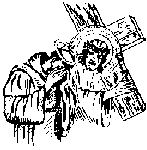THE ROMAN CATHOLIC CHURCH
Her Doctrine and Morals
Twenty-Second Sunday after Pentecost
20 October 2024
![[Image]](ss.gif)
THE ROMAN CATHOLIC CHURCHHer Doctrine and MoralsTwenty-Second Sunday after Pentecost20 October 2024 |
The SundaySermon
|
Click the button on the right to be told about updates. Your address will be kept strictly private. |
Dear Friends in Christ,
Render to Ceaser what is Ceaser's and render to God what is God's. The conflict between the spiritual and the material is a common struggle. Many tend towards one extreme or the other. The Materialist will live as if there were nothing spiritual, and the misguided heretics will attempt to live as if they do not have bodies. Our lives are a constant balance between the two. We must have faith and not fear penance and sacrifice, but we must also take care of the life and health of our bodies. We must be prudent and provide for the necessities of life, but we must have faith and trust in Divine Providence. Virtue is in the middle — in prudently balancing the needs of both body and soul. This balance is not always easy, but it is essential in our spiritual journey.
God is the Creator of both material and immaterial — physical and spiritual. We are right in the center of all His Creation. We have souls like the angels and bodies like animals, plants, and all material things. The soul is superior to the body, so we should always show a preference for the life of our souls over the life of our bodies. This is what animates the martyrs. It is better to die in this life and in this body so that we may live eternally in Heaven with God.
While we may legitimately sacrifice our bodies for our souls, we may not sacrifice our souls for our bodies. However, the inversion of right order (the sacrifice of spiritual goods for material ones) is a principal temptation offered to us by the demons. Without faith and trust in Divine Providence, the greedy are left scrambling to accumulate money or this world's goods. We are left to consider what profit treasures will be to us after our deaths. Even if the Materialist truly believes there is nothing spiritual, it is still illogical to accumulate the things of this earth when we will soon have to leave them all behind when we die. The efforts and energy of the Materialist are all in vain when we consider a longer time period than our own physical lives here on Earth. Trust in Divine Providence provides us with a sense of security and protection, guiding our actions and decisions.
On the other hand, while we may legitimately long with Saint Paul to be dissolved in Christ and to be freed from this body of death here on earth, we may do nothing to truly harm or injure the physical life that God has given us. Murder is forbidden by God, even the murder of ourselves (suicide). Our lives are not our own to do with as we may please. Neither is the life conceived in the womb of a woman hers to do with as she pleases. We must answer to God for our physical life and the physical lives of those entrusted to us.
We are sometimes asked how far we must go to preserve our physical lives and health. The Church's teaching is that we are only obliged to use the ordinary means of caring for and maintaining the life of our bodies. This line often becomes quite fuzzy as our technology advances. The machines that temporarily replace organs are useful in emergencies, but they are far from ordinary means of preserving physical life. There is no command to preserve our physical lives at all costs. It frequently appears that those who do not wish to spare any expense in their treatments have lost or grown weak in their spiritual lives. They would do better spending more time in preparation for death rather than in preservation of our temporal lives.
In the care of our bodies, moderation is the key. Moderate fasting and penance are suitable for the body. The penitential seasons of the Church allow our bodies a time of rest from the surfeit we often experience. Fasting does not mean starvation, and penance does not mean mortal injury. When overindulged, most things become harmful to our bodies and souls. Total abstinence from things is preferable to some because they find it too difficult to be moderate. Food and drink are good, but overindulgence is bad for both body and soul. While we cannot completely abstain from food and drink, we can completely abstain from certain foods or beverages that have become our weakness.
We could debate whether some of the things we consume should be considered food or poison. Aside from this debate, we can absolutely affirm that we must practice moderation in all things. Or we must use this world's things as if we did not use them. Sometimes, we can find the answer by asking if something is truly a need or a want. Can we make better choices even if there is some difficulty in doing so? In this manner, we can practice penance and prudence and care for our spiritual and physical lives and health.
May the Immaculate Heart of Mary inspire, guide, and protect us!
 |
|
Would you like to make a donation?
Or, just log onto PayPal.com, after signing in you can send your donation to us at: Friars@friarsminor.org .
Return to Menu.
Return to Homepage.